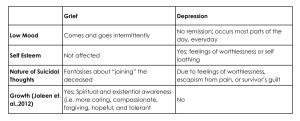Completing a course of cancer treatment is a huge victory, a great milestone and a cause for tremendous celebration. However, it is important to remember that the journey is not over. Just like a war survivor returning to a ravaged hometown, cancer survivors may find themselves facing a new reality marked by loss. Cancer survivorship is about rebuilding a life that is meaningful to you.
Let’s explore some questions to guide us as we create a fulfilling life after cancer recovery.
What are some losses throughout the cancer journey?
It is natural to experience a range of emotions after facing losses during your cancer journey. Grief is not just for bereavement; it can show up in many forms, including when we lose things we hold dear. These losses can trigger feelings of sadness, anger, or frustration, and that is okay. Some potential losses due to cancer includes:
- Biological – Loss of physical function, loss of appearance (e.g. hair loss, body parts removal) etc.
- Psychological – Loss of identity, loss of self-esteem, loss of independence etc.
- Social – Changes in social relationships, loss of social skills due to extended isolation, loss of work etc.
- Spiritual – Loss of meaning in life etc.
- Practical – Loss of income and finances etc.
Despite completing treatment, it is normal for cancer survivors to experience a mix of emotions when recovering from cancer-related losses. The following are common emotions that cancer survivors experience (Ismail et. al., 2023):
- Denial – E.g. “How can this happen to me!”
- Anger – E.g. “What have I done to deserve this?”
- Bargaining – E.g. “What should I do to avoid relapse?”
- Depression – E.g. “No one will need me, I’m useless.”
Experiencing grief due to a cancer diagnosis is a journey. Allow yourself the space and time to feel your emotions and acknowledge what you feel. Grief is a complex feeling that involves alternating back-and-forth between feelings of loss and recovery. As cancer survivors begin to heal over time, they become more oriented towards taking actions to adjust to a new normal such as rebuilding of health, functioning, identity etc (Ismail et. al., 2023).
How can we adjust to life after cancer?
Some of the common challenges adjusting to life after cancer include (BeatCancer, 2024):
- Biological: Dealing with side effects of cancer treatment, regaining strength and stamina
- Psychological: Stress management at work, learning new skills
- Social: Interpersonal skills
- Spiritual: Reprioritising life priorities upon re-evaluation of the meaning in life
- Practical: Re-organising life commitments when going back to work
Here are some ways that we can address the above challenges:
- Biological: Consult your physician & physiotherapist to help improve physical stamina
- Psychological: Consult a vocational coach, engage in self-care activities, focus on your strengths, engage in hobbies
- Social: Reconnect with friends, upskilling, hone interpersonal skills, seek family support
- Spiritual: Engage in faith practices, explore meaningful activities such as becoming a volunteer
- Practical: Undergo job coaching, start small by taking on part-time jobs
While the above tips can be helpful, consulting with your doctor or other healthcare professionals is always recommended. Remember, progress takes time. Be patient with yourself as you navigate these changes in different areas of your life. It is important to set realistic expectations about what you can achieve during your recovery process.
How do I find meaning and acceptance after recovering from cancer?
Setting realistic goals
Naturally, after finishing cancer treatment, the desire to return to normalcy takes hold. Setting goals becomes a priority, but it’s crucial to ensure these goals are realistic, achievable, and tailored to your new post-cancer life. You may consider these guidelines when planning for such goals (BeatCancer, 2024):
- Prioritise goals that are more important to you – Acknowledge that our time & energy is limited and prioritise accordingly
- Be aware of our limits – Know what we can and cannot do after treatment
- Simplify goals into small and gradual steps
- Involve healthcare team and loved ones in goals
- Be flexible and make adjustments when required
Practicing self-compassion
Self-compassion facilitates the execution of set goals through engaging in positive self-talk in the following ways (Kacel, 2023):
- Self-kindness: Extending grace and forgiveness to oneself when faced with setbacks in the quest of adjusting back to the community or to normal functioning. (E.g. I might have made a mistake at work but I choose to forgive myself, learn from it, and move on.)
- Common humanity: Considering setbacks to be part and parcel of being human prevents excessive self-criticism (E.g. Everyone makes mistakes at some point. It is okay. I just have to be more careful in the future)
- Mindful acceptance: Accepting the temporariness of setbacks, and to instead focus on personal strengths/resources in the present (E.g. I may have failed now, but with enough practice and perseverance, I can overcome these obstacles and become successful)
Activities that bring meaning to life
The cancer journey, which involves the contemplation of the dying process and death, will lead cancer survivors to reevaluate and discover their meaning in life. The following are some ways to discover your meaning in life (Mount Sinai, n.d.):
- Perceiving life as starting anew – Cancer serves as a wake-up call for some to re-evaluate their life priorities, and to change the trajectories of their lives
- Journaling – Keeping a diary can help bring insight to what gives meaning to your life
- Giving back – This includes volunteering, leaving behind a legacy, or just living in the moment to help others
- Seeking support – Attending a support group help connect cancer survivors, allowing them to draw strength from others’ experiences
- Meditate/Pray – Sitting in silence creates a space to enable personal reflection on the meaning of life
Acknowledge every small progress
Acknowledging small progresses can motivate us to continue working towards our set goals (Amabile and Kramer, 2011). This encourages us to appreciate our strengths and embrace the potential for growth. Just like celebrating walking on our own and then training to run, we can build on what we have.
What are some ways to rebuild my life after cancer?
Rebuilding your own identity (Healthline, 2020).
- Define own values – Cancer can lead to the loss of personal identity due to the multiple losses incurred. The way to restore your identity is to first redefine your values. Identify potential values that are important to you and justify why they are important. (E.g. If you value selflessness, you may sacrifice your personal time to attend to the needs of those around you.)
- Make own choices – Decisions should involve prioritizing your health and wellbeing first so that you can take better care of those around you. (E.g. Upon being aware of your selflessness values, it might be important to set clearer boundaries in your relationships to prevent an emotional burnout.)
- Spend time alone – It is essential to spend quality time with yourself to get to know yourself more, which can enforce your personal identity.
- Consider ways to achieve your ideals – Apart from knowing ourselves well, we should also ensure that our actions align to our values.
Prioritize important things or people in your life (LinkedIn, 2023)
- List down things or people that are most important to you
- Rank the list
- Repeat the process for the next couple of days to ensure consistency
- Prioritise the top few on the list as they are the most important to you and you may reflect on the values that influenced you to prioritise them
- Take action to prioritise these important things or people
Miracle questions
Let’s start with the big picture! Imagine your ideal outcome. Then, we can use these questions to work backward and map out the steps needed to reach your desired goals:
- What will life be like if you didn’t have the problem?
- What would you be doing differently?
- What current patterns of behaviors would likely be eliminated?
Legacy activities
Facing cancer is a difficult journey, but survivors have a special strength to empathise and uplift each other with their stories, bringing hope to those who are fighting the same battle. We can consider how we would like others to remember us and our stories through the following mediums (Allen, 2009):
- Writing or recording stories on paper
- Leaving a voice recording on the phone
- Doing up a scrapbook or photo album
- Video recording
The completion of treatment is a milestone, not a finish line. It marks the start of a new chapter filled with growth and possibilities. With hope and perseverance, you can reclaim your life and rediscover meaning on this exciting journey.
There are many similarities between grief and depression. So, how do we know if the grieving towards cancer-related losses would require some form of attention? Refer to the following table to find out more (Schneider, 1980):

Coping with grief can be overwhelming. If you or a loved one feel like your grief is more than you can handle on your own, our counsellors are here to listen and offer support.






